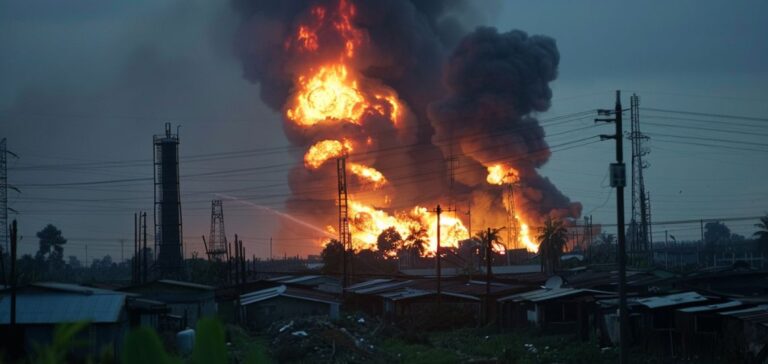On March 17, 2025, a fire affected one of Nigeria’s major pipelines, the Trans Niger Delta Pipeline (TNP), a crucial conduit for transporting crude oil in the country. The fire broke out at the border of the Kpor and Bodo communities in the Niger Delta region and was discovered during a routine night patrol by the Rivers State police. Shell Petroleum Development Company (SPDC), the operator of the pipeline, was immediately informed and implemented security measures, including shutting down the pipeline to mitigate risks. The police confirmed that the situation was under control but did not specify the extent of material or environmental damage.
Pipeline management and its context
The Trans Niger Delta Pipeline, which transports crude oil from the onshore fields in southern Nigeria to the Bonny export terminal, represents a strategic infrastructure for the country’s oil industry. However, the control of the pipeline has recently been transferred to Renaissance Africa Energy, a consortium comprising Petrolin, led by businessman Samuel Dossou-Aworet, and several Nigerian oil companies. This transition follows the acquisition of Shell’s onshore assets in the region, finalized the previous week. This shift could impact the future management of this critical infrastructure.
Ongoing security and maintenance challenges
The Niger Delta region is frequently the site of oil spills and sabotage. The causes are numerous, including a lack of maintenance of pipelines as well as criminal acts, often linked to armed groups or local residents who siphon oil to illegally refine it. These spills are also fueled by acts of vandalism. Between 2018 and 2023, the Nigerian National Oil Spill Detection and Response Agency (NOSDRA) recorded nearly 3,870 oil spills, primarily in this region. This phenomenon exposes the country to significant environmental and economic risks.
Significant economic and social impact
The Niger Delta, rich in hydrocarbons, remains a paradoxical area, where poverty persists despite vast oil resources. Local communities regularly denounce the negligence of major oil companies, accusing them of contributing to environmental pollution without providing direct economic benefits. Numerous fishing and farming areas, once vital sources of income, have been devastated by repeated oil spills. The community of Bodo, for example, is currently suing Shell for oil spills dating back to 2008, a case that has yet to be resolved in the British courts.






















